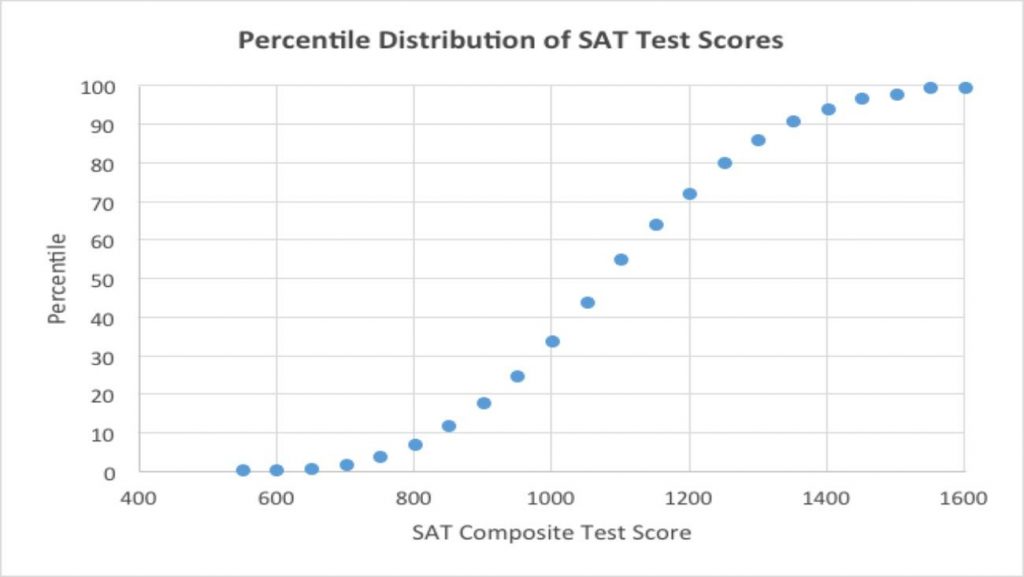What Is a Good SAT Score? Is My SAT Score Bad, Average, Good or Great?
You may have wondered what is a good SAT Score? Or better yet, what is a good SAT Score for me? As you prepare for the SAT, you may wonder, “What does my score mean? Is it even a good, average, or a great score?” There are a lot of variables to consider as you prepare for the SAT.
Most desirable universities, including UC, CSU, privates, and out-of-states, want students to earn at least a 1300 in order to be seriously considered as a qualified candidate. However, this figure varies greatly depending on your major, the competitiveness of the applicant pool that year, and other factors taken into account in the admissions process.
For a precise breakdown of what percentage of college students get each score, check out this score levels chart.
The Answer to “What Is a Good SAT Score for Me?”
It depends. For some students, their maximum scores may be 1300-1400. Others can achieve 1500-1600. Many factors can affect your SAT score:
- Upbringing
- Background
- Resource constraints
- Educational restraints
- Family circumstances
No matter where you come from, you can choose your own destiny. That’s why your score also depends on:
- YOUR existing capabilities
- YOUR passion to succeed
- YOUR goals
- How much time YOU invest in studying and preparing
While it is impossible to determine each student’s exact numerical potential, we encourage students to consider the following ways to determine your score, or what we call a “target score.”
What is a Target SAT score?
A student’s “target score” is a range that can be calculated in one of two ways. Try the following methods, using a calculator and writing utensil.
Option 1. The SAT Baseline Score Method
The first way is to use what we call a “baseline score.” This method helps you set an achievable goal, taking into account how much time you realistically have to work with. A student’s baseline score is simply calculated based on the score you received from your first at taking the SAT with little or no prior preparation. We use the following steps to determine a SAT baseline score.
- Take the SAT practice test with little or no preparation.
- Once you have determined this score, add 100 – 200 points.
- This new score is your “target score,” or the score you need to shoot for with studying and proper preparation.
- For example, if a student’s baseline score is 1200, they should aim for 1300-1400.
Option 2. The Unweighted GPA Method
The second way is the unweighted GPA formula.
- Take your overall unweighted GPA as shown on your most recent official transcript.
- Divide the GPA by the maximum GPA (usually 4.0)
- Multiply this ratio by 1600 to find the proportional test score value. (Round it to the nearest tens place).
- Finally, add and subtract 50 points from that value to determine a student’s “target score” range.
- For example, if a student’s unweighted GPA is a 3.5:
- 3.5/4.0 = 0.875
- 0.875 * 1600 = 1400
- Add and subtract 50
- Results: the student’s target score is between 1350-1450
Implementing a score range allows us to account for variability in test difficulty and score curving by the College Board. It also gives a student a higher probability of successfully achieving their goal, as earning something within a 100 point range is more probable (and less stressful) than fixating on one singular score and beating yourself up if you don’t achieve it.

SAT Test Requirements: Looking Ahead
With the pandemic long past, the class of 2024 is seeing the beginning of the return of SAT requirements. With Ivy League schools and other top colleges zeroing in on test scores, it’s possible that the trend will extend to other universities as well in the next few years, with additional school requiring test scores.
Wondering if taking the SAT is right for you, or hoping to get some targeted SAT test prep? Our expert admissions counseling services at ReadyEdgeGo include customized SAT test prep to help you maximize your score without wasting your time reviewing concepts you already know well. Get in touch today to start boosting your SAT potential!










